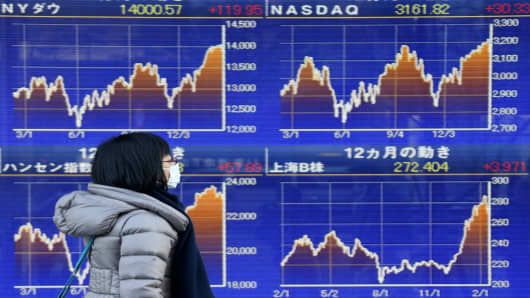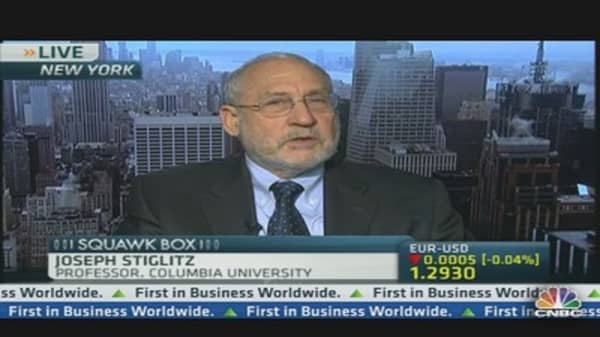The Nikkei surged as much as 4.7 percent a day after the Bank of Japan (BOJ) gave investors what they were waiting for – aggressive monetary easing – and analysts say the current rally is gaining a momentum of its own and not simply riding on a weakening yen.
The Nikkei rose to its highest levels since August 2008 on Friday, before trimming gains on profit-taking to close up 1.6 percent. Most of the 35 sub-sectors of the benchmark index were in positive territory and the rally in domestic-focused stocks suggested the stock market was not simply banking on a weak yen to deliver economic growth.
"If you look at the break down of gains today [Friday], the real-estate sector is up 14 percent," said Nicholas Smith, Japan strategist at CLSA in Tokyo. "Real estate, financials, banks and brokers are all asset plays here."
(Read More: Soros to CNBC: What Japan Is Doing Is 'Quite Dangerous')
The BOJ on Thursday unveiled radical measures to boost inflation and meet a 2 percent inflation target in two years. It plans to inject $1.4 trillion into the economy in less than two years, doubling the monetary base and buying government bonds of all maturities. The bank's previous asset-purchase program had focused on buying bonds with a three-year maturity.
"Clearly the Bank of Japan was significantly more aggressive than markets had anticipated, so this is positive for stocks in the short-term," said Standard Chartered Bank's investment strategist Steve Brice.
"The fact that we are also seeing bond yields plummet shows that increasingly investor psychology towards Japan is starting to change – if we are going to get inflation in Japan then we're looking at negative real yields and that should encourage investment in stocks," he added. "That's why the moves in stocks are outperforming the move in dollar-yen."
(Read More: BOJ Throws In Kitchen Sink in War With Deflation)
The yen continued its slide in early Asia trade, weakening to its lowest level in three and a half years to 97 against the dollar. Plus, the 10-year Japanese government bond yield hit a record low of 0.32 percent.
"The Bank of Japan caught a lot of people by surprise and that's why we're seeing strong moves today as investors give their vote of confidence," said Kelly Teoh, markets strategist at IG Markets. "I would expect the gains in the Nikkei and the fall in the yen to continue in the short-term."





